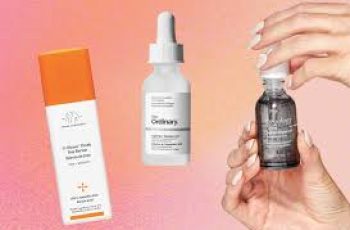
Can I Use Vitamin C Serum and Rosehip Oil Together?
If you’ve ever wondered whether rosehip oil and vitamin C serum can be used together in a skincare routine, you’re not alone. This combo confuses a lot of people—and for good reason!
Rosehip oil often gets misunderstood. Many think it’s too oily or too rich. Others simply aren’t sure where it fits in their routine.
So today, we’ll cover everything from the benefits of rosehip oil, how it works with vitamin C, how to layer them, and what results to expect.
Let’s get into it!
What Are the Benefits of Rosehip Oil?
Rosehip oil is derived from the seeds and fruit of the rose plant. It’s full of skin-loving nutrients that deliver a variety of benefits for different skin types.
Here’s a breakdown of why rosehip oil is worth your attention:
1. High in Linoleic Acid
Rosehip oil contains around 60% linoleic acid, a fatty acid that helps maintain healthy skin. This ingredient hydrates, calms irritation, and may reduce acne.
Linoleic acid is particularly useful for those with oily or breakout-prone skin, which often lacks this essential fatty acid.
2. Loaded with Antioxidants
It’s rich in vitamins C and E, both known for their ability to fight free radicals and reduce environmental skin damage.
Free radicals are unstable molecules caused by UV rays, pollution, and stress. They break down collagen and lead to dullness and early signs of aging.
Rosehip oil neutralizes these molecules and keeps your skin barrier protected and functioning.
3. A Natural Source of Vitamin A
Vitamin A in rosehip oil (also called a natural retinoid) promotes faster skin cell turnover, improving tone, texture, and firmness.
It also helps to fade hyperpigmentation, dark spots, and acne scars over time.
In short, rosehip oil is hydrating, protective, and regenerative—all in one golden oil.
Is Rosehip Oil Better Than Vitamin C Serum?
This depends on what you’re trying to achieve.
If your goal is brightening or reducing dark spots, then vitamin C serum is your best bet.
If your skin is dry, irritated, or needs nourishment, rosehip oil delivers fatty acids and antioxidants to deeply replenish your barrier.
For most people, both can be used in a routine—just not at the same time of day.
Apply vitamin C in the morning to protect and brighten. Follow with rosehip oil at night to repair and hydrate while you sleep.
This separation helps avoid irritation and allows each ingredient to do its best work.
Can I Use Rosehip Oil After a Serum?
Yes, absolutely! In fact, that’s how it’s meant to be used.
Apply rosehip oil after your serum to lock in moisture and nutrients. It acts as an occlusive, sealing in hydration from previous steps.
Make sure your serum is water-based, like those containing hyaluronic acid or glycerin. These humectants draw water into your skin.
Follow that with moisturizer, then apply rosehip oil as the final step to seal everything in. This layering helps your skin absorb and retain moisture all day.
When Should I Apply Rosehip Oil in My Routine?
As a general rule, always apply your skincare products from thinnest to thickest texture.
Cleanser comes first, followed by toner, then serum. Moisturizer comes next, and rosehip oil goes on last.
Rosehip oil is best used at night, especially if you’re also using vitamin C or exfoliating acids in the morning.
At night, the skin naturally enters repair mode, and rosehip oil helps enhance this regeneration process.
It also keeps skin soft and reduces any tightness or flakiness you might feel after using potent actives.
Can Rosehip Oil Cause Breakouts?
This is one of the most common myths—and the answer might surprise you.
Although it’s an oil, rosehip oil is classified as a dry oil. That means it absorbs quickly and doesn’t leave a greasy residue.
It’s also non-comedogenic, meaning it won’t clog your pores or trigger acne—unless your skin is particularly reactive.
If your skin is oily or acne-prone, rosehip oil can still work for you. In fact, its linoleic acid content may help balance sebum production.
However, if you’re worried about breakouts, start slowly. Apply a small amount at night and see how your skin reacts over several days.
And of course, consult a dermatologist if you’re unsure or if your skin is prone to severe breakouts.
Can I Mix Rosehip Oil with Hyaluronic Acid?
Yes—you can, and you should!
This duo makes a powerful moisture-locking combination for all skin types, especially in colder seasons or dry climates.
Here’s how to layer them correctly:
Cleanse your face with a gentle, pH-balanced cleanser.
Apply a hyaluronic acid serum to damp skin. This draws water into the surface layers.
Follow with a moisturizer to provide additional hydration and barrier support.
Seal everything in with rosehip oil as the final step in your routine.
Doing this ensures the skin stays hydrated, balanced, and radiant for longer.
Can You Use Rosehip Oil and Vitamin C Serum Together?
Yes, but it’s best to use them at different times of the day.
Vitamin C is a powerful antioxidant that defends your skin during the day, while rosehip oil helps replenish and repair overnight.
Here’s a sample daily routine to follow:
Morning Routine:
Gentle cleanser, Vitamin C serum, Hyaluronic acid (optional), Lightweight moisturizer, Sunscreen
Evening Routine:
Cleanser, Hydrating toner or essence, Hyaluronic acid serum, Moisturizer, Rosehip oil
This method avoids potential sensitivity and gives your skin the chance to benefit fully from both ingredients.
If you want to simplify your routine, try using vitamin C serum every other morning and rosehip oil nightly.
How Long Before You See Results?
With consistent use, most people begin seeing results from rosehip oil or vitamin C serum within 2 to 4 weeks.
Vitamin C works fairly quickly to brighten the skin, reduce pigmentation, and protect from oxidative stress.
Rosehip oil may take a little longer, but with regular application, you’ll notice improved texture, less redness, and better hydration.
The key is to be consistent and not introduce too many new products at once. Let your skin adjust.
What Skin Types Can Use Rosehip Oil?
Rosehip oil is suitable for all skin types, including oily, dry, mature, and sensitive skin.
If you have dry or mature skin, you’ll love its deep hydrating and firming effects.
If you have sensitive or reactive skin, patch test first. While it’s generally well tolerated, everyone’s skin is different.
And if you’re oily or acne-prone, don’t be afraid to try it—especially if other oils have made your skin worse. Rosehip is often the exception.
Final Tips Before You Start
Always patch test new products, especially oils.
Store rosehip oil in a cool, dark place to preserve its nutrients.
If it smells rancid or changes color, it may have oxidized—replace it.
Look for cold-pressed, organic rosehip oil for best quality.
Introduce new products slowly to avoid overwhelming your skin.
Final Thoughts: Vitamin C + Rosehip Oil = Radiant Skin
Using vitamin C and rosehip oil together can elevate your skincare routine. These two ingredients support and enhance each other when used properly.
Vitamin C gives you protection and brightness in the morning. Rosehip oil repairs, nourishes, and deeply hydrates in the evening.
Together, they promote smoother, healthier, and more youthful skin over time.
And remember: your skin is unique. What works for someone else may not be your perfect match. But with a bit of experimentation and patience, you’ll find the balance that works for you.
If you’re curious to learn more or want to share your results, come join us on Instagram! Our DMs are always open, and we’d love to hear from you.


